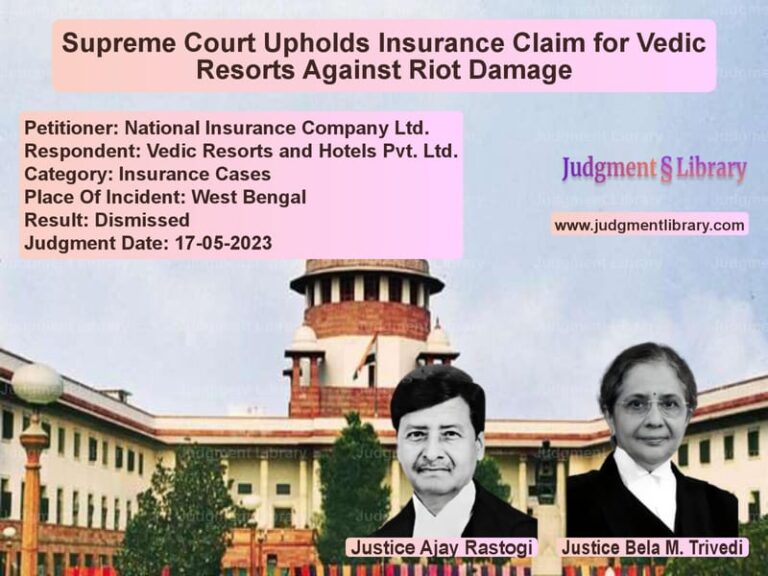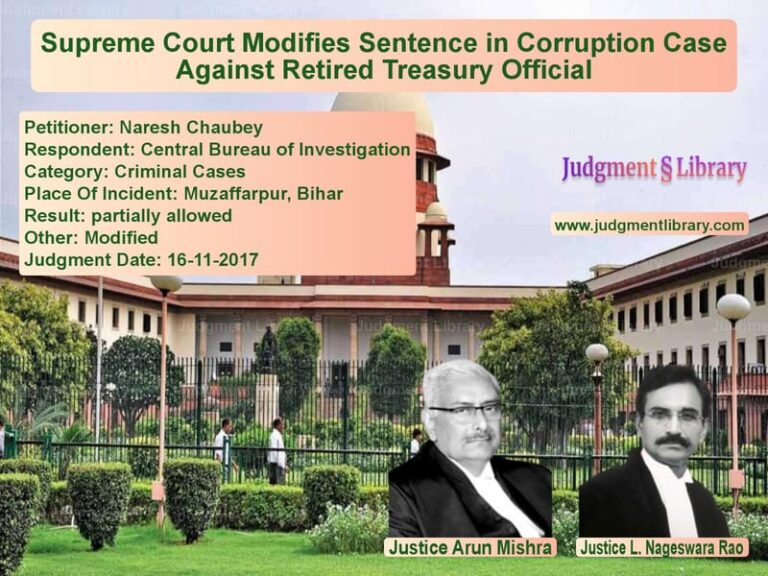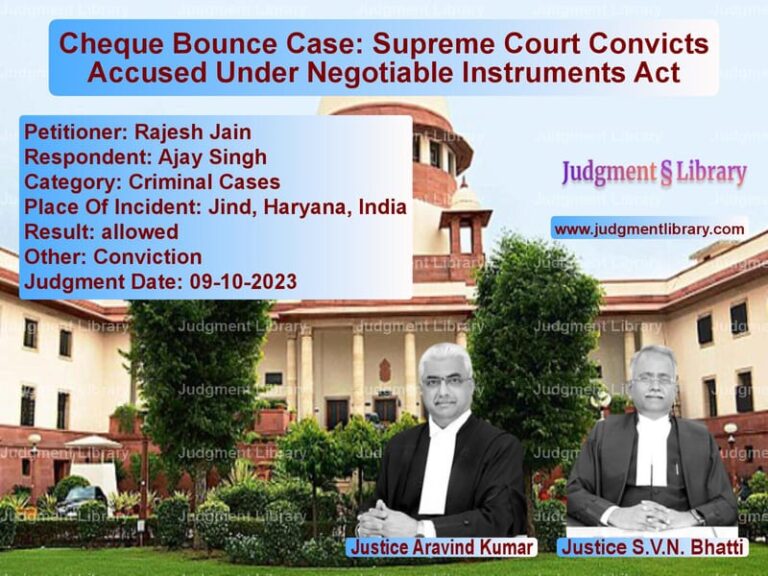Supreme Court Orders Reconsideration of Premature Release for Life Convict in Bihar
The Supreme Court of India, in the case of Rajo @ Rajwa @ Rajendra Mandal v. The State of Bihar & Ors., examined the legality and fairness of the Bihar government’s refusal to grant premature release to a life convict who had served over 24 years in prison. The Court directed the Remission Board to reconsider the convict’s application afresh, emphasizing the importance of evaluating remission applications based on post-conviction conduct, earned remissions, and other rehabilitative factors.
Background of the Case
The petitioner, Rajo @ Rajwa @ Rajendra Mandal, was convicted in 2001 for the murder of three individuals, including two police personnel and a chowkidar, during a village festival. He was sentenced to life imprisonment under Section 302/34 of the Indian Penal Code and Section 27 of the Arms Act.
The timeline of key events is as follows:
- May 24, 2001: The trial court convicted the petitioner and sentenced him to life imprisonment.
- September 1, 2005: The Patna High Court upheld the conviction.
- July 19, 2013: The petitioner completed 14 years of actual imprisonment.
- July 19, 2019: He completed 20 years of actual imprisonment.
- April 14, 2021: He applied for premature release under the Bihar Jail Manual.
- May 19, 2021: The Remission Board rejected the application, despite favorable reports from the probation officer and jail authorities.
- April 20, 2023: A second application was rejected, citing adverse reports from the Superintendent of Police and the Presiding Judge.
- August 25, 2023: The Supreme Court directed the Remission Board to reconsider the application, criticizing the over-reliance on outdated judicial reports.
Key Legal Issues Considered
The Supreme Court examined the following key issues:
- Whether the petitioner was eligible for premature release under the Bihar Jail Manual.
- Whether the rejection of his application was arbitrary and ignored relevant considerations.
- Whether the Remission Board gave undue weight to the Presiding Judge’s opinion without considering the petitioner’s post-conviction conduct.
Arguments by the Petitioner
The petitioner, through his counsel, contended:
- He had already served over 24 years in actual custody and had earned additional remission of 4 years and 8 months.
- His total sentence, including remission, exceeded 28 years, which made him eligible for release.
- The Remission Board unfairly prioritized the Presiding Judge’s opinion over the positive reports from the jail superintendent and probation officer.
- The rejection of his application was arbitrary and violated his fundamental rights.
Arguments by the Respondents
The State of Bihar argued:
- The petitioner was involved in a premeditated, organized murder of public servants, making him ineligible for premature release under Rule 529(iv)(b) of the Bihar Jail Manual.
- The Superintendent of Police and the Presiding Judge opposed the release, citing potential law-and-order issues.
- The petitioner’s crime was of a heinous nature, justifying continued incarceration.
Supreme Court’s Analysis and Judgment
1. Consideration of Post-Conviction Conduct
The Supreme Court emphasized that remission decisions should not be based solely on the nature of the crime but must consider the convict’s behavior in prison:
“The discretion that the executive is empowered with in executing a sentence would be denuded of its content if the presiding judge’s view—formed largely on the basis of judicial records—is mechanically followed.”
2. Over-Reliance on Judicial Opinion
The Court criticized the Remission Board for relying heavily on the Presiding Judge’s opinion, which was primarily based on the original conviction record rather than the petitioner’s conduct over 24 years in prison:
“Such a report cannot be relied on as carrying predominance if it focuses on the crime, with little or no attention to the criminal.”
3. Purpose of Remission
The Court reiterated that remission serves as a reward for good behavior and rehabilitation:
“The aim and ultimate goal of imprisonment, even in the most serious crimes, is reformative. If a stereotypical approach in denying remission is adopted, it defeats the entire idea of encouraging reformation.”
Supreme Court’s Final Decision
The Supreme Court directed the following:
- The Remission Board must reconsider the petitioner’s application within three months.
- The Presiding Judge must provide a fresh opinion, taking into account the convict’s reformation.
- The State of Bihar must ensure that remission policies are applied fairly, without undue bias.
Conclusion
This ruling reinforces key legal principles:
- Reformation should be the focus of remission decisions: The post-conviction conduct of a prisoner is crucial.
- Judicial opinions must be balanced: The trial judge’s report should not be given overriding importance.
- Remission policies should not be applied arbitrarily: The convict’s earned remissions and good behavior must be considered.
This judgment ensures that premature release decisions are based on fairness, reformation, and constitutional principles.
Petitioner Name: Rajo @ Rajwa @ Rajendra Mandal.Respondent Name: The State of Bihar & Ors..Judgment By: Justice S. Ravindra Bhat, Justice Prashant Kumar Mishra.Place Of Incident: Madhepura, Bihar.Judgment Date: 25-08-2023.
Don’t miss out on the full details! Download the complete judgment in PDF format below and gain valuable insights instantly!
Download Judgment: rajo-@-rajwa-@-rajen-vs-the-state-of-bihar-&-supreme-court-of-india-judgment-dated-25-08-2023.pdf
Directly Download Judgment: Directly download this Judgment
See all petitions in Bail and Anticipatory Bail
See all petitions in Custodial Deaths and Police Misconduct
See all petitions in Judgment by S Ravindra Bhat
See all petitions in Judgment by Prashant Kumar Mishra
See all petitions in allowed
See all petitions in Remanded
See all petitions in supreme court of India judgments August 2023
See all petitions in 2023 judgments
See all posts in Criminal Cases Category
See all allowed petitions in Criminal Cases Category
See all Dismissed petitions in Criminal Cases Category
See all partially allowed petitions in Criminal Cases Category







